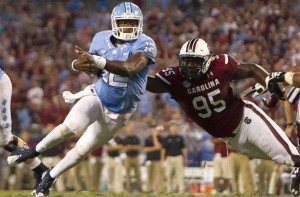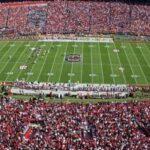Will the North Carolina Tar Heels Spoil Clemson’s Championship Party?

The only loss for Marquise Williams and the UNC Tar Heels this season was the season opener to South Carolina. Another Palmetto State team will look to recreate history in the ACC Championship Game.
If you’re hoping for some drama in the unveiling of the four-team College Football Playoff this coming Sunday, then your best hope is for North Carolina to upset top-ranked Clemson as (+5) underdog in the ACC Championship Game. If you’re a handicapper, it’s just as important to be aware of how strongly the Tar Heels are coming, both on the football field and at the betting window.
North Carolina lost its season-opener to South Carolina 17-13. It’s a mark of how long ago that was, that the Tar Heels were actually a (+1.5) dog to the Gamecocks, who have gone on to a disastrous season. North Carolina hasn’t lost since.
The turnaround wasn’t apparent immediately. While UNC won their next six games, it was a soft part of the schedule. The most impressive wins were against disappointing Georgia Tech, Illinois and Virginia—all of whom finished with losing records.
Then came a Thursday Night visit to Pittsburgh on October 29 to start the meat of the schedule, the games that would determine the winner of the ACC’s Coastal Division. North Carolina stepped it up in a big way—not only did they win their final five games, but they covered the number four times. The finishing surge made UNC 8-4 ATS (against the spread).
This five-game stretch started with the prime-time win at Pitt, and included home victories over Duke and Miami. North Carolina then survived Virginia Tech in overtime—the one non-cover in this schedule sequence, and closed out the season with a win over N.C. State.
All of these games were against bowl-bound teams and all except Virginia Tech finished with at least seven wins—and even at Virginia Tech, North Carolina had to deal with an exceptionally pumped-up Hokie team for head coach Frank Beamer’s final home game.
What’s keyed this North Carolina turnaround that suddenly makes them a viable upset candidate against the nation’s #1 team and maybe even a candidate for the College Football Playoff themselves? It starts with a significantly improved pass defense and a balanced offense that can beat you most any way it wants.
In the game at Pitt, the Tar Heels had to face one of the more dynamic receivers in college football, the Panthers’ Tyler Boyd. The great wideout got his catches—10 in all, but UNC limited the damage to 89 yards. When you compare the two teams’ passing output, North Carolina quarterback Marquise Williams averaged 11.7 yards-per-attempt, while Pitt’s Nathan Peterman averaged just 6.2.
The pattern continued the next week against archrival Duke. Williams lit it up, going 23/35 for 494 yards, an astonishing 14.1 yards-per-attempt. Blue Devil counterpart Thomas Sirk struggled to 18/37 for 191 yards, or 5.2 yards-per-attempt.
North Carolina’s pass defense continued to hold up against Miami, Virginia Tech and N.C. State. In these cases, the opposing defenses were able to keep Williams’ big-play ability under a little bit better control. But the Tar Heel quarterback stayed efficient, stayed away from mistakes and head coach Larry Fedora simply dialed up the ground game.
Williams is a dynamic dual-threat quarterback, and he rushed for 101 yards against Miami. Running back Elijah Hood, who will likely pass the 1,300-yard mark for the season on Saturday night, ran for 132 more, as UNC outrushed Miami 294-99.
Against Virginia Tech, both the Tar Heels and Hokies ran the ball 47 times. North Carolina, thanks primarily to Hood, got 240 yards to just 130 for their opponent.
In the finale against N.C. State, Hood simply unleashed, with 220 yards on 21 carries. The Heels finished with an insanely good 9.1 yards-per-rush as a team. The Wolfpack ran it pretty well themselves, but averaged “only” 5.9. With North Carolina doing what they wanted offensively and not allowing the big-play passes on defense, they won the game 45-34.
North Carolina’s defense has taken some knocks in the media and as the N.C. State game showed, they’re far from flawless. But the numbers say this is the 19th-ranked defense in the country in the bottom line of points allowed. The offense is in the Top 10 nationally.
Fedora’s team, in short, has no big-picture weaknesses. They can move the ball by air or by ground, and if forced to the ground can use with Williams or go it the conventional way with Hood. They can keep your offense underneath and force you to execute on long drives, something that’s harder to do in big pressure situations when the opposing offense is constantly moving the ball.
Now we come to the biggest test yet. Clemson, by the standards of a #1 team, isn’t bursting with talent. You can make a good case that some recent Tiger teams that didn’t achieve this status were better at the skill positions—names like C.J. Spiller, Andre Ellington, Sammy Watkins and Martavis Bryant have come through Clemson in recent years, just to pick a few. But this Clemson team is finding ways to win and quarterback DeShaun Watson will get some love in the Heisman Trophy voting.
My focus and that of my staff, is on breaking down game tape. If North Carolina’s play these final five games can translate against Clemson’s talent, then they offer value. If we’re less optimistic after the film review, then it’s a game to either stay away from or to lay the points. Whatever you decide in your own handicapping, just be aware of how good North Carolina has been in its final five games, as we get ready for Saturday night in Charlotte.
Jim Hurley has been a successful public handicapper since 1985, when he began a Network that emphasized a team approach to handicapping. Hurley consults with statistical analysts, personnel experts and Vegas insiders to narrow the NFL and college cards down to the most bettable games each and every week. Visit him online at www.winningedge.com.













